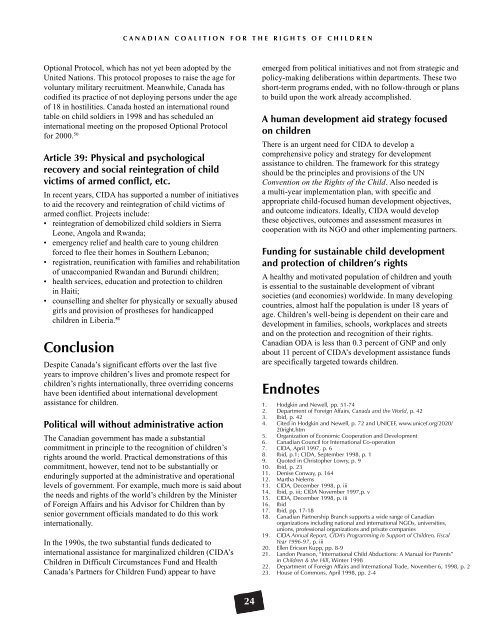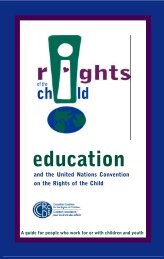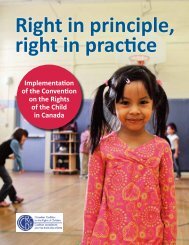Poste - Canadian Coalition for the Rights of Children
Poste - Canadian Coalition for the Rights of Children
Poste - Canadian Coalition for the Rights of Children
You also want an ePaper? Increase the reach of your titles
YUMPU automatically turns print PDFs into web optimized ePapers that Google loves.
C A N A D I A N C O A L I T I O N F O R T H E R I G H T S O F C H I L D R E N<br />
Optional Protocol, which has not yet been adopted by <strong>the</strong><br />
United Nations. This protocol proposes to raise <strong>the</strong> age <strong>for</strong><br />
voluntary military recruitment. Meanwhile, Canada has<br />
codified its practice <strong>of</strong> not deploying persons under <strong>the</strong> age<br />
<strong>of</strong> 18 in hostilities. Canada hosted an international round<br />
table on child soldiers in 1998 and has scheduled an<br />
international meeting on <strong>the</strong> proposed Optional Protocol<br />
<strong>for</strong> 2000. 50<br />
Article 39: Physical and psychological<br />
recovery and social reintegration <strong>of</strong> child<br />
victims <strong>of</strong> armed conflict, etc.<br />
In recent years, CIDA has supported a number <strong>of</strong> initiatives<br />
to aid <strong>the</strong> recovery and reintegration <strong>of</strong> child victims <strong>of</strong><br />
armed conflict. Projects include:<br />
• reintegration <strong>of</strong> demobilized child soldiers in Sierra<br />
Leone, Angola and Rwanda;<br />
• emergency relief and health care to young children<br />
<strong>for</strong>ced to flee <strong>the</strong>ir homes in Sou<strong>the</strong>rn Lebanon;<br />
• registration, reunification with families and rehabilitation<br />
<strong>of</strong> unaccompanied Rwandan and Burundi children;<br />
• health services, education and protection to children<br />
in Haiti;<br />
• counselling and shelter <strong>for</strong> physically or sexually abused<br />
girls and provision <strong>of</strong> pros<strong>the</strong>ses <strong>for</strong> handicapped<br />
children in Liberia. 51<br />
Conclusion<br />
Despite Canada’s significant ef<strong>for</strong>ts over <strong>the</strong> last five<br />
years to improve children’s lives and promote respect <strong>for</strong><br />
children’s rights internationally, three overriding concerns<br />
have been identified about international development<br />
assistance <strong>for</strong> children.<br />
Political will without administrative action<br />
The <strong>Canadian</strong> government has made a substantial<br />
commitment in principle to <strong>the</strong> recognition <strong>of</strong> children’s<br />
rights around <strong>the</strong> world. Practical demonstrations <strong>of</strong> this<br />
commitment, however, tend not to be substantially or<br />
enduringly supported at <strong>the</strong> administrative and operational<br />
levels <strong>of</strong> government. For example, much more is said about<br />
<strong>the</strong> needs and rights <strong>of</strong> <strong>the</strong> world’s children by <strong>the</strong> Minister<br />
<strong>of</strong> Foreign Affairs and his Advisor <strong>for</strong> <strong>Children</strong> than by<br />
senior government <strong>of</strong>ficials mandated to do this work<br />
internationally.<br />
In <strong>the</strong> 1990s, <strong>the</strong> two substantial funds dedicated to<br />
international assistance <strong>for</strong> marginalized children (CIDA’s<br />
<strong>Children</strong> in Difficult Circumstances Fund and Health<br />
Canada’s Partners <strong>for</strong> <strong>Children</strong> Fund) appear to have<br />
24<br />
emerged from political initiatives and not from strategic and<br />
policy-making deliberations within departments. These two<br />
short-term programs ended, with no follow-through or plans<br />
to build upon <strong>the</strong> work already accomplished.<br />
A human development aid strategy focused<br />
on children<br />
There is an urgent need <strong>for</strong> CIDA to develop a<br />
comprehensive policy and strategy <strong>for</strong> development<br />
assistance to children. The framework <strong>for</strong> this strategy<br />
should be <strong>the</strong> principles and provisions <strong>of</strong> <strong>the</strong> UN<br />
Convention on <strong>the</strong> <strong>Rights</strong> <strong>of</strong> <strong>the</strong> Child. Also needed is<br />
a multi-year implementation plan, with specific and<br />
appropriate child-focused human development objectives,<br />
and outcome indicators. Ideally, CIDA would develop<br />
<strong>the</strong>se objectives, outcomes and assessment measures in<br />
cooperation with its NGO and o<strong>the</strong>r implementing partners.<br />
Funding <strong>for</strong> sustainable child development<br />
and protection <strong>of</strong> children’s rights<br />
A healthy and motivated population <strong>of</strong> children and youth<br />
is essential to <strong>the</strong> sustainable development <strong>of</strong> vibrant<br />
societies (and economies) worldwide. In many developing<br />
countries, almost half <strong>the</strong> population is under 18 years <strong>of</strong><br />
age. <strong>Children</strong>’s well-being is dependent on <strong>the</strong>ir care and<br />
development in families, schools, workplaces and streets<br />
and on <strong>the</strong> protection and recognition <strong>of</strong> <strong>the</strong>ir rights.<br />
<strong>Canadian</strong> ODA is less than 0.3 percent <strong>of</strong> GNP and only<br />
about 11 percent <strong>of</strong> CIDA’s development assistance funds<br />
are specifically targeted towards children.<br />
Endnotes<br />
1. Hodgkin and Newell, pp. 51-74<br />
2. Department <strong>of</strong> Foreign Affairs, Canada and <strong>the</strong> World, p. 42<br />
3. Ibid, p. 42<br />
4. Cited in Hodgkin and Newell, p. 72 and UNICEF, www.unicef.org/2020/<br />
20right.htm<br />
5. Organization <strong>of</strong> Economic Cooperation and Development<br />
6. <strong>Canadian</strong> Council <strong>for</strong> International Co-operation<br />
7. CIDA, April 1997, p. 6<br />
8. Ibid, p.1; CIDA, September 1998, p. 1<br />
9. Quoted in Christopher Lowry, p. 9<br />
10. Ibid, p. 23<br />
11. Denise Conway, p. 164<br />
12. Martha Nelems<br />
13. CIDA, December 1998, p. iii<br />
14. Ibid, p. iii; CIDA November 1997,p. v<br />
15. CIDA, December 1998, p. iii<br />
16. Ibid<br />
17. Ibid, pp. 17-18<br />
18. <strong>Canadian</strong> Partnership Branch supports a wide range <strong>of</strong> <strong>Canadian</strong><br />
organizations including national and international NGOs, universities,<br />
unions, pr<strong>of</strong>essional organizations and private companies<br />
19. CIDA Annual Report, CIDA’s Programming in Support <strong>of</strong> <strong>Children</strong>, Fiscal<br />
Year 1996-97, p. iii<br />
20. Ellen Ericson Kupp, pp. 8-9<br />
21. Landon Pearson, “International Child Abductions: A Manual <strong>for</strong> Parents”<br />
in <strong>Children</strong> & <strong>the</strong> Hill, Winter 1998<br />
22. Department <strong>of</strong> Foreign Affairs and International Trade, November 6, 1998, p. 2<br />
23. House <strong>of</strong> Commons, April 1998, pp. 2-4




